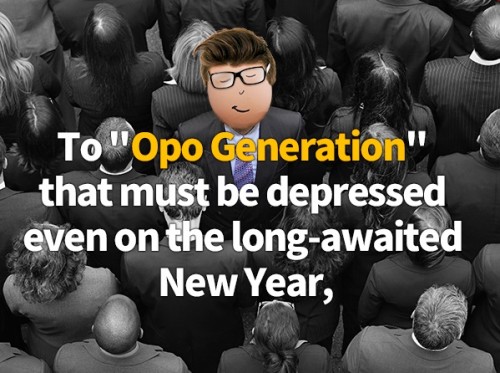 |
The long-awaited new year has come. But it's unwelcome by young people filled with pain. The year 2015 ended with the lonely suicide of a woman in her 20s and the suicide of elite student of Seoul National University.
The end of youth employment is depression. There is even a post "How to avoid opposite sex with depression" spreading online. Whether they are male or female, many young people of "Opo" generation even plunge into a world where they can be happy without any worries. Opo Generation refers to the generation that gives up five major life events, such as dating, marriage, raising children, social life, and owning a house.
 |
The future of young people is threatened by unstable future and unemployment. What will be the world look like in the future?
# Decline of working-age population in advanced countries threatening the global economy in 2016
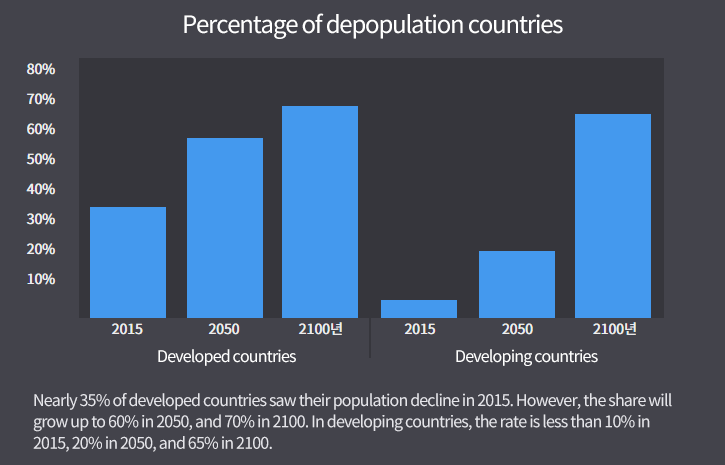 |
Look at the chart. According to United Nations projections, population growth will decline in 60% of the countries in the world by 2100. The share of elderly population (aged 65 or older) will grow up to 38%.
This will immediately threaten the world economy. If the number of young people falls along with labor and purchasing power, it will be "double-dose of bad news."
# Is this only developed countries' problem?
Population decline also takes place in emerging and developing countries. China, which accounts for 20% of the world's population, could also face labor shortage in 2050.
China had a clear reason to abolish its one-child policy. It's because of the workforce reduction.
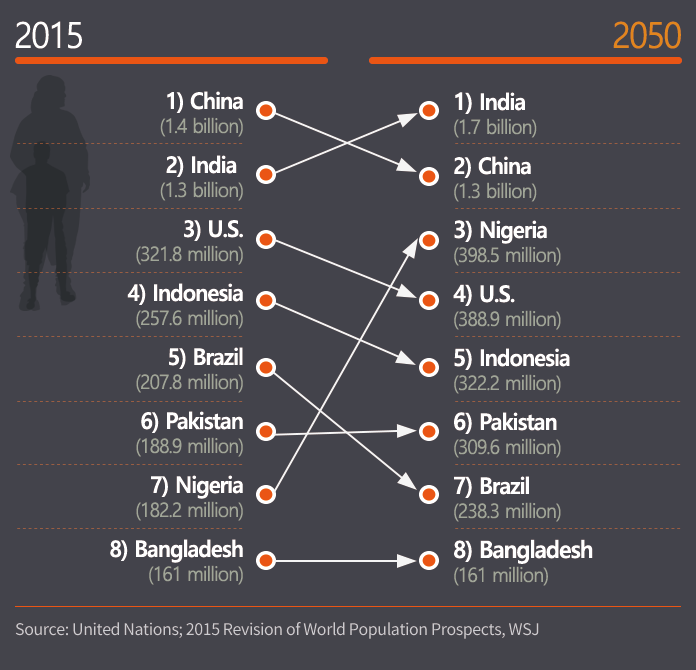 |
Fertility rates are increasing in India and Africa. In 2050, India will be the world's most populous country beating China. Low-income countries will make up 14% of the world's population in 2050, compared with 9% now. How will such change in world population affect us?
# Refugees are growth engine of future economy?
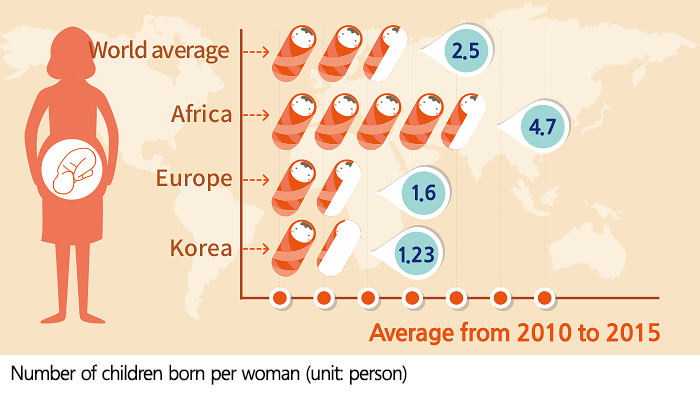 |
The Wall Street Journal predicted that increased population of low-income countries would lead to increase in immigration from low-income countries to rich countries.
The WSJ claimed that the acceptance of refugees or immigrants could eventually be a new growth engine in the major advanced countries that experience low-growth recession.
These results can be found in many reports. The 'Global Monitoring Report 2015/2016' jointly announced by World Bank and IMF said, "While the world's population is aging, countries at all stages of development can harness demographic transition such as immigration as tremendous development opportunity."
According to the European Commission's economic forecast for 2015-2017, the huge influx of migrants will increase EU's GDP (Gross Domestic Product) by 0.2 to 0.3 percent by 2017.
# Is South Korea the exception?
What about S. Korea's situation? If you think it's nonsense to say that working-age population will shrink while young people are struggling to get a job, read the following carefully.
Among advanced countries, Korea's expected degree of working-population decline is 26%, the second highest following Japan.
The working-population will start to decline in 2017, and will rapidly shrink in 2020 when baby boomers retire. The World Bank (WB) advised that it will be a benefit for Korea and Japan, which are relatively advanced countries in East Asia, to open their labor markets and accept young immigrants in Asia.
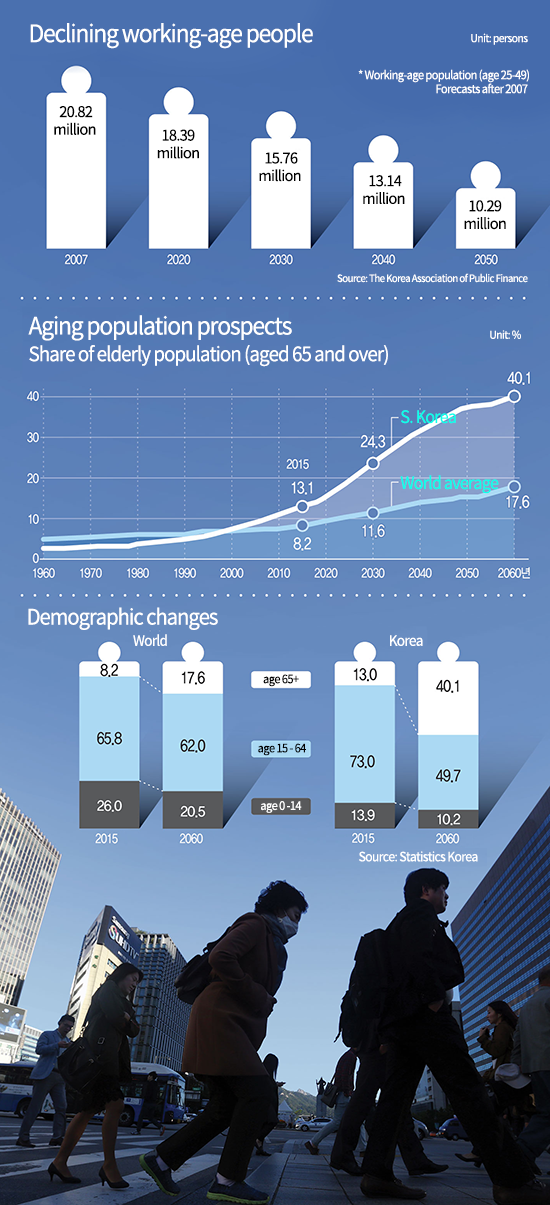 |
# No more youth unemployment! Now there is a war for talent.
In 2015, some 204 million people were unemployed. Youth unemployment (ages 15-24) has soared, with an estimated 74 million youth out-of-work.
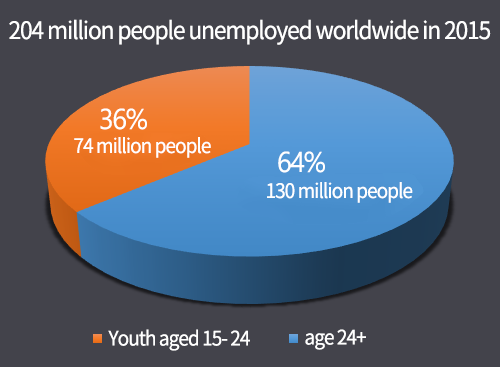 *Source: United Nations Development Programme; Human Development Report 2015 |
This is not just a problem that Korea has. The UN report pointed out that young people in many countries only have an opportunity to work temporarily.
In Spain, youth unemployment has risen to 53%.
On the other hand, 'old' advanced countries need young people that can support the elderly population and circulate economy. They are trying to replace young people with immigrants. But that is not easy, either.
Japanese business daily Nihon Keizai Shimbun (Nikkei) prospected, "The population of developing countries, which were usually human resource senders, will soon decrease and advanced countries will wage war over limited human resources."
# Is there any other obstacle?
There are many obstacles. Would young people with high level education be able to find a job that match their needs?
In addition, political opposition and hatred in each country are other obstacles to overcome.
Imagine that young talented people of this country are heading to the world's stage. What if well-educated young people go out and end up cleaning up the streets? What about cleaning the machine? What if they are in charge of taking old people a bath or walk?
Of course, we are not trying to belittle jobs. There may be a gap between what you want and the reality.
"If you don't take action, you won't fail nor succeed."
Nevertheless, finding a job abroad can be an opportunity. New chances come in the new environments.
After all, the final decision is yours.
Although you don't have nothing right now, would you still plant your apple tree for tomorrow?
2016 has come. The wave of change has already begun.
Most Read
-
1
-
2
-
3
-
4
-
5
-
6
-
7





















